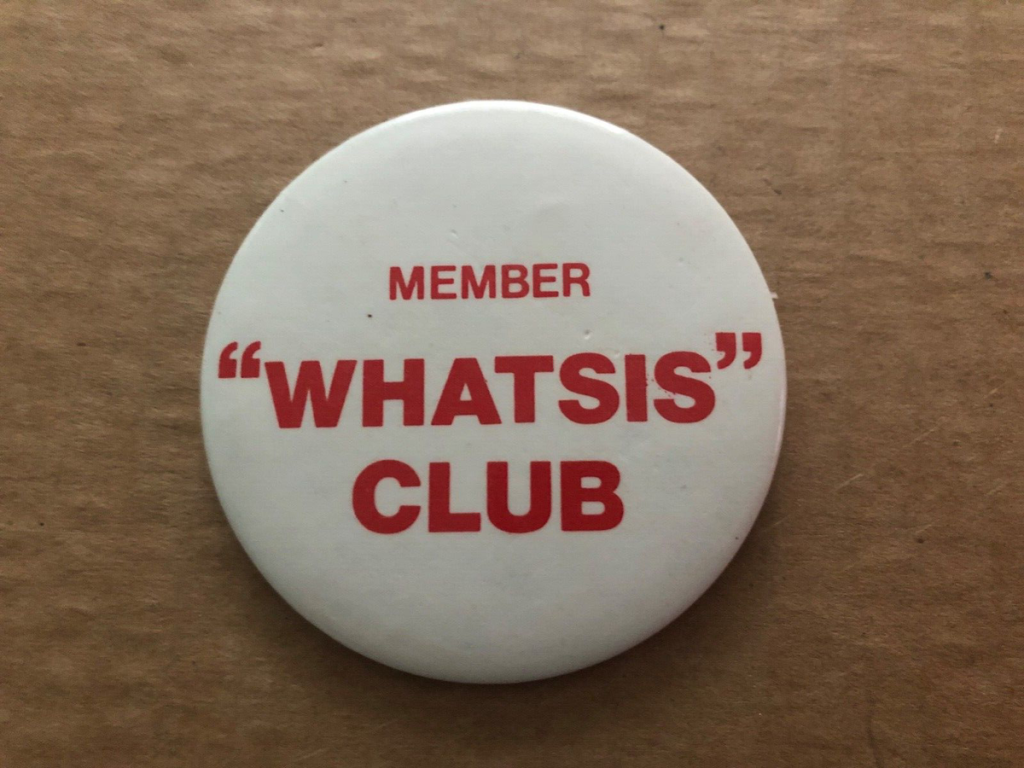To appeal to all those who are growing older—at every age—we suggest some of the best new books on aging, as well as many classics. You’ll find everything from caregiving advice to memoirs, from humor to reflection, plus narratives by authors who set out, in midlife, in search of wisdom and new ways to think about growing older.
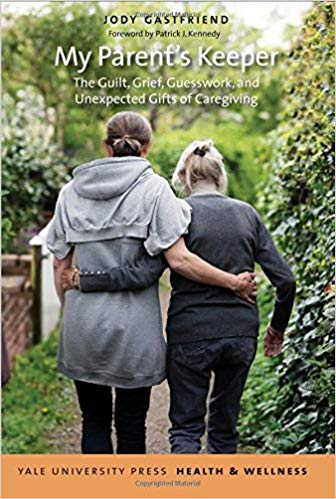 My Parent’s Keeper: The Guilt, Grief, Guesswork, and Unexpected Gifts of Caregiving Posted in: Life’s Endings, Memoirs, Nonfiction
My Parent’s Keeper: The Guilt, Grief, Guesswork, and Unexpected Gifts of Caregiving Posted in: Life’s Endings, Memoirs, NonfictionBy Jody Gastfriend—Yale University Press (2018)
As we humans are living longer, the sandwich generation has moved to the club sandwich, as we care for not only parents and kids but grandparents and grandchildren, all at once. Is it any wonder we’re stressed out? Jody Gastfriend, social worker and vice president of senior care services at Care.com, designed a highly respected program for employers wanting to support staff who are caregivers. She also looked after her own father, who had Alzheimer’s. In this book, she delves into the challenges of caring for parents in declining health. Gastfriend leaves no possible situation unaddressed. She covers parents who refuse help and siblings who are unsupportive, along with the more practical basics of dementia care and of working with institutions and navigating social services and insurance claims. She considers the future of caregiving, which may involve technology and robotics. Pitfalls and rewards are covered in equal measure. Aging expert Ellen Goodman calls this book “the ultimate GPS for family caregivers.” You’ll want to have it in your library.
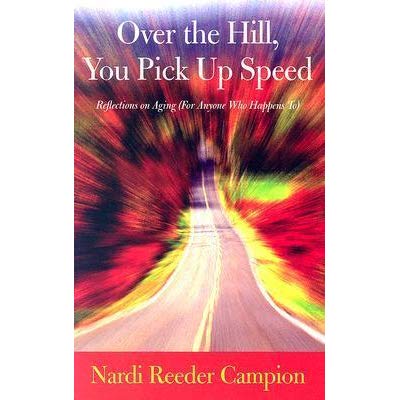 Over the Hill, You Pick Up Speed: Reflections on Aging (For Anyone Who Happens To) Posted in: Nonfiction, Views from the Oldest among Us
Over the Hill, You Pick Up Speed: Reflections on Aging (For Anyone Who Happens To) Posted in: Nonfiction, Views from the Oldest among UsBy Nardi Reeder Campion – University Press of New England, 2006
Reading this very funny, unusually candid book is like having a conversation with a dear friend, no longer young, who is willing to talk about what old age is really like. Over the Hill is a collection of Campion’s columns from the Valley News in West Lebanon (NH), which published her work for 25 years. She also wrote nine books, plus articles for publications such as the New Yorker and the New York Times.
Campion, who died in 2007, always was willing to laugh at herself. In one column, she describes the embarrassing incident that convinced her it was time to give up driving. In the next, she turns to the subject of “Twelve Ways to Get Around Without a Car.” Number 11 is hitchhiking, which she tried three times (at the age of 86) before deciding it wasn’t for her. This is great reading for anyone who appreciates understated humor and wants to peek at what future years may bring.
 Calypso Posted in: Nonfiction, Views from the Oldest among Us
Calypso Posted in: Nonfiction, Views from the Oldest among UsBy David Sedaris—Little, Brown and Company, 2018
After a five-year hiatus, humorist and essayist David Sedaris returns to the bestseller list in his signature style, ruminating about family and aging (he’s 62). Those new to Sedaris’ writing will be quickly brought up to speed about his siblings, his sister who took her own life and his dad, now in his 90s. It’s his late mother, though, who figures prominently here and whose influence continues long after her passing. Clearly, the funnyman still misses her and longs to make a true connection with his father and remaining siblings while he still can. So he purchases a beach house (names it the Sea Section) in North Carolina, where the family can gather to both get away and reminisce. Returning fans will find this essay collection as insightful, biting and funny as ever, if a bit darker at times—Sedaris facing his mortality, perhaps? His observational humor targets the state of politics (no Trump fan, he) and his family members (he’s tender and scathing in equal measure). If you love an I-can’t-believe-he-said-that moment, this is the book for you.
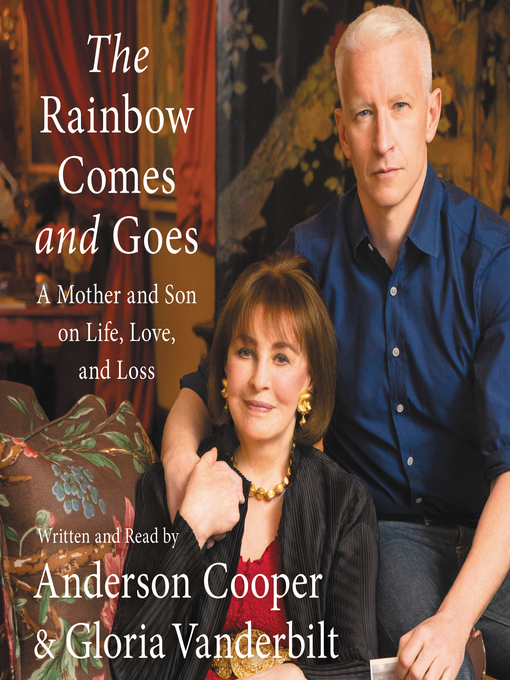 The Rainbow Comes and Goes: A Mother and Son on Life, Love, and Loss Posted in: Memoirs, Nonfiction
The Rainbow Comes and Goes: A Mother and Son on Life, Love, and Loss Posted in: Memoirs, NonfictionBy Anderson Cooper and Gloria Vanderbilt — Harper, 2016
Do you ever wonder how your story will be remembered? After heiress Gloria Vanderbilt, the “poor little rich girl” of the infamous 1940s child custody battle, has a life-threatening illness at 91, her son Anderson Cooper, the CNN news correspondent, commits to understanding his mother better in the time they have left. What follows is a year-long email exchange between the two that allows for revelations and unburdening. She exploited the family name; he shunned it. She worked the socialite circles; he, the war zones. Ever the journalist, Cooper delves into his mother’s lonely, privileged childhood, her salacious affairs and multiple marriages, as well as who she was in her professional life far beyond her iconic designer jeans. Her story is deeply personal, at times heartbreaking, full of wisdom and insights on the freedom and clarity aging has brought to her, and with some maternal advice. The mutual affection is clear. Tell someone your story before it’s too late.
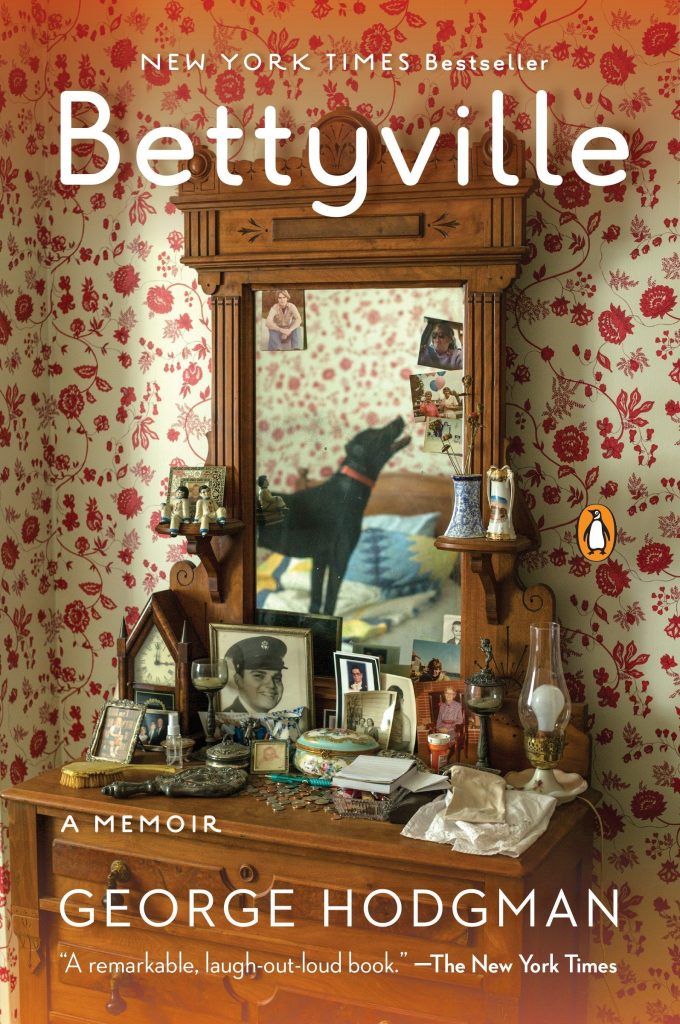 Bettyville: A Memoir Posted in: Memoirs, Nonfiction
Bettyville: A Memoir Posted in: Memoirs, NonfictionBy George Hodgman – Penguin Books, 2016
George Hodgman is an urbane and sophisticated gay man, blissfully separated from his upbringing in Paris, MO. When his irascible, outspoken, strong-willed mother, Betty, falling into dementia, loses her driver’s license, George returns to Paris, intending to settle her into a care facility and head back to Manhattan. Once in his childhood home, George comes to terms with his closeted upbringing and the desire to please his parents. Mother and son reunite with a combination of drama and comedy that seems to leap off the page. In a way, it may do just that: Paramount announced in May 2016 that it’s making the memoir into a television series, starring a dream cast of Matthew Broderick as George and the incomparable Shirley MacLaine as Betty.
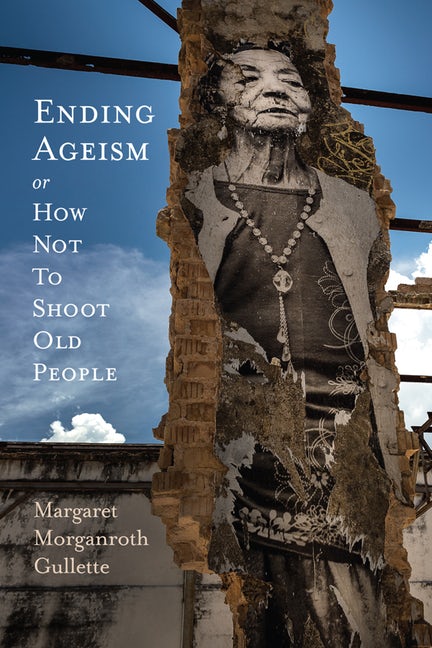 Ending Ageism or How Not to Shoot Old People Posted in: Nonfiction
Ending Ageism or How Not to Shoot Old People Posted in: NonfictionBy Margaret Morganroth Gullette – Rutgers University Press, 2017
If you’re not sure what ageism is, or you doubt that it does much harm, read this book. Author Margaret Morganroth Gullette examines this “most acceptable and unnoticed of the cruel prejudices.” She explores ageism in its many manifestations, including the widely held (erroneous) assumptions that old age is inevitably a time of decline and decrepitude and that older people are a burden on society. Challenging our culture’s relentless focus on youth—which motivates many to try to hide their age—she also describes other incarnations of ageism, including actual violence against older people. Ending Ageism is densely packed with facts and insights and isn’t always an easy read, but it’s a passionate argument that has something important to say to people of all ages.
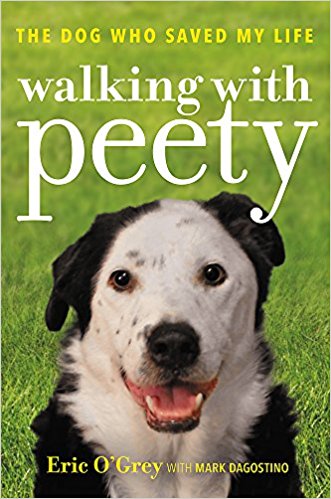 Walking with Peety: The Dog Who Saved My Life Posted in: Inspiring Journeys, Nonfiction
Walking with Peety: The Dog Who Saved My Life Posted in: Inspiring Journeys, NonfictionBy Eric O’Grey with Mark Dagostino – Grand Central Publishing, 2017
Do you know a yo-yo dieter looking for inspiration, maybe a couch potato who needs a nudge in the right direction? Eric O’Grey was in his early 50s, depressed and in a rut. His diets never panned out and he was easily 150 pounds overweight, spending a fortune on prescriptions to control his blood pressure, blood sugar and cholesterol. And then a new doctor prescribed a trip to the dog shelter. There he chose obese, middle-aged Peety, and everything changed. Slowly, due to daily walks, the duo began to take off weight and put on energy. Their bond inspired Eric to finally commit to a radical diet to be deserving of Peety’s love. This is a charming success story that sweetly poses the question: who really rescued whom?
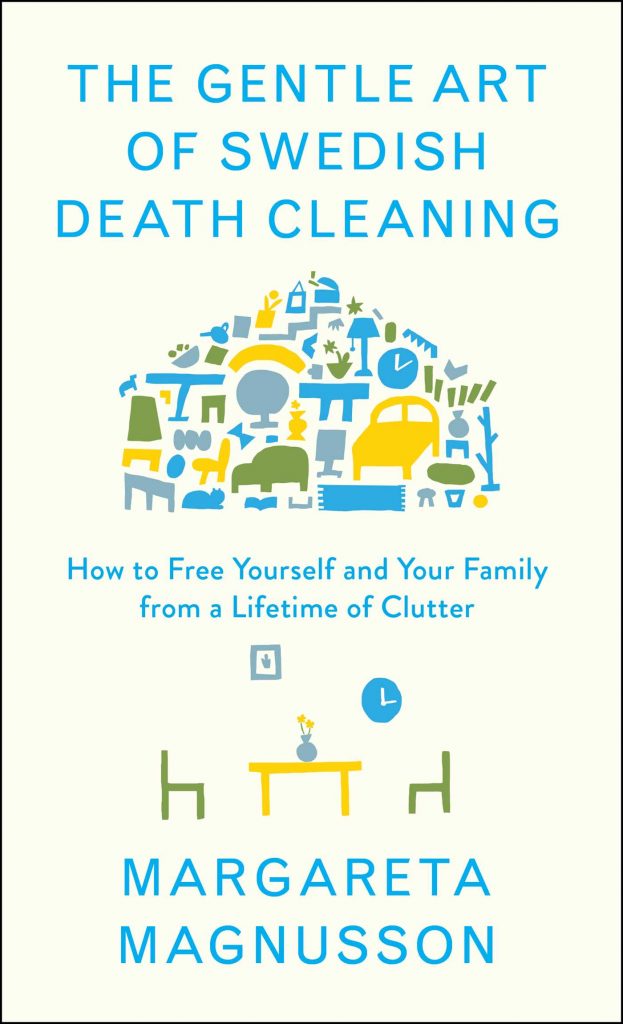 The Gentle Art of Swedish Death Cleaning: How to Free Yourself and Your Family from a Lifetime of Clutter Posted in: Insights from Bold Thinkers, Life’s Endings, Nonfiction
The Gentle Art of Swedish Death Cleaning: How to Free Yourself and Your Family from a Lifetime of Clutter Posted in: Insights from Bold Thinkers, Life’s Endings, NonfictionBy Margareta Magnusson – Scribner, 2018
Sure, you’re a jolly good fellow, but if you’d like to be remembered as such, don’t leave a lifetime’s worth of junk—aka personal collections—for others to clean up when you die. Margareta Magnusson has firsthand experience in dealing with this type of dirty work, which the Swedes call döstädning, or death cleaning. Creepy name, liberating concept. She professes to be “between 80 and 100” and reveals some of what she’s kept and why, as well as the things she has let go, and how. She leaves nothing to the imagination, tackling everything from private matters in bedside drawers to what’s left on social media platforms. If you have attempted to pare down using a different book that promised a changed life but was just too harsh, Magnusson’s humor and practicality may be what you need. You don’t need to toss everything at once: her approach to death cleaning is that it’s a process that should be undertaken again and again as needs change. When the time comes, your family will thank you.
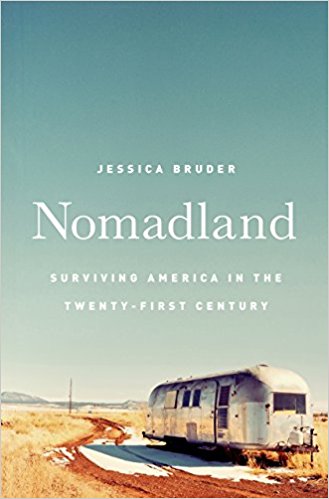 Nomadland: Surviving America in the Twenty-First Century Posted in: Insights from Bold Thinkers
Nomadland: Surviving America in the Twenty-First Century Posted in: Insights from Bold ThinkersBy Jessica Bruder – W.W. Norton, 2017
The American dream of a secure, leisurely retirement is simply not reality for many people. Low-wage workers, and those with insufficient savings due to bad health, poor planning, unlucky investing or the Great Recession, will have to work as long as they live. This book introduces us to the older workforce that is taking to the road for seasonal jobs. That nice 70-something couple managing the campground? Medical bills wiped out their bank account. Older man working at the amusement park? Lost his savings in the housing bust. Many seasonal workers live in their cars, vans or RVs in Walmart parking lots, where they form an unexpected, sometimes dysfunctional community. This house-less lifestyle provides mortgage-free shelter and mobility to people forced to choose between food and keeping a “roof” over their heads. The stories in this book are fascinating. You’ll want to travel along as Bruder explores both the challenges faced and the resilience shown by this generation of workers living life on the road.
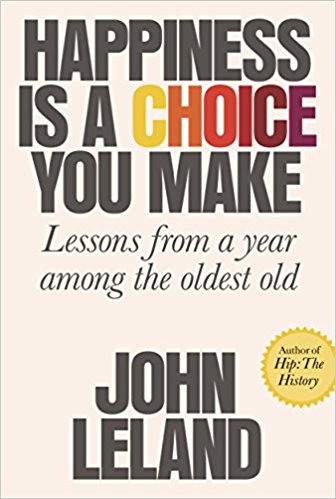 Happiness Is a Choice You Make: Lessons from a Year Among the Oldest Old Posted in: Nonfiction, Views from the Oldest among Us
Happiness Is a Choice You Make: Lessons from a Year Among the Oldest Old Posted in: Nonfiction, Views from the Oldest among UsBy John Leland – Sarah Crichton Books, 2018
New York Times reporter John Leland undertook a project to research old age, not from those studying it but from those living it. He followed six New Yorkers, all 85 or older—no marathoners or record-breakers but everyday folks—and shared the intimate makeup of their days. They lived with and without illness and limitations, independently or with varying degrees of help. Almost everything about them differs, except for the fact that they each have made their way to a place of contentment and slower living that allows a connection with others. Each person fears dying, but not death itself; all six find joy in reminiscing and in plans for tomorrow. As for Leland himself, despite a good relationship with his 89-year-old mother, he was not expecting to enjoy himself in the year he invested with his subjects—he didn’t buy “the older we get, the happier we become” platitudes. But after his year with the oldest old, Leland became convinced there was wisdom there, and that he was the better man for embracing it.
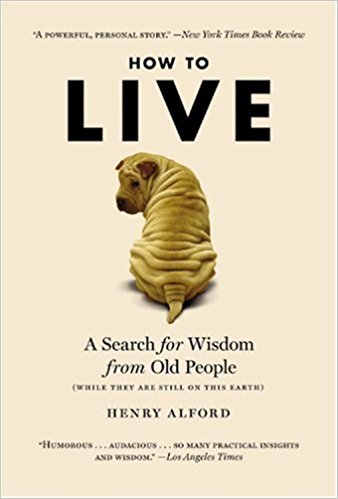 How to Live: A Search for Wisdom from Old People (While They Are Still on This Earth) Posted in: Views from the Oldest among Us
How to Live: A Search for Wisdom from Old People (While They Are Still on This Earth) Posted in: Views from the Oldest among UsBy Henry Alford – Twelve, 2009
Henry Alford takes readers along as he interviews people over 70 about the concept of wisdom. He describes contemporary studies of the aging brain, scholarly studies of wisdom, and he throws in quotes from sages, ranging from Buddha to Muhammad Ali. Alford’s interviewees discuss everything from the importance of living in the moment to the way they feel about dying. For instance, playwright Edward Albee disapproves of death as a “terrible waste of time,” while spiritual leader Ram Dass says he has a “very friendly attitude to it.” In the end, the wisdom in the book comes mostly from Alford himself as he pulls ideas together.
Interspersed is the saga of Alford’s mother’s divorce, which occurred while he was writing How to Live. This engrossing story of a woman willing to make a new life for herself at 79 definitely holds your interest, though it may not have much to do with wisdom. How to Live offers few earthshaking insights but lots of small epiphanies.
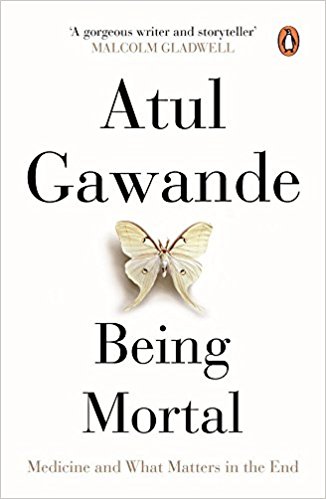 Being Mortal: Medicine and What Matters in the End Posted in: Insights from Bold Thinkers, Life’s Endings
Being Mortal: Medicine and What Matters in the End Posted in: Insights from Bold Thinkers, Life’s EndingsBy Atul Gawande – Picador, 2015
With increased longevity in the news, you don’t have to look hard to find a book about living better. But after watching his father’s death, physician Atul Gawande asks if we could be dying better. The advent of improved medicine and life-extending options means those who are terminally ill may die only after years of uncomfortable and expensive interventions—and without fulfilling their goals for the time remaining. Both in his medical practice and when his father became terminally ill, Gawande recognized how ingrained it is for physicians to try to fix and cure when what is needed is care and a listening caregiver. Now he wants us all to see what he sees, that everyone has desires, needs and goals, no matter how long they have left. Let’s listen.
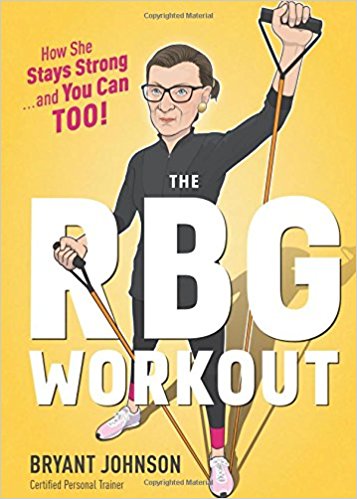 The RBG Workout: How She Stays Strong … and You Can Too! Posted in: Guides to Aging Well, Views from the Oldest among Us
The RBG Workout: How She Stays Strong … and You Can Too! Posted in: Guides to Aging Well, Views from the Oldest among UsBy Bryant Johnson – Houghton Mifflin Harcourt, 2017
This terrific little book packs a punch, or at least a kick or two. Personal trainer Bryant Johnson shares the exercise routine he developed for US Supreme Court Justice Ruth Bader Ginsburg. Complete with illustrations and tips, the book takes us through the workout, with bonus anecdotes about the pair’s long friendship. (Ginsburg calls Bryant the most important man in her life.) The workout is indeed challenging. Planks! Medicine balls! But it’s also designed so you can do it at home with minimal gear. So instead of being intimidated, let this inspire you. After all, 85-year-old Ginsburg has been doing this for a long time, and she’s on top of her game—in the gym and on the bench.
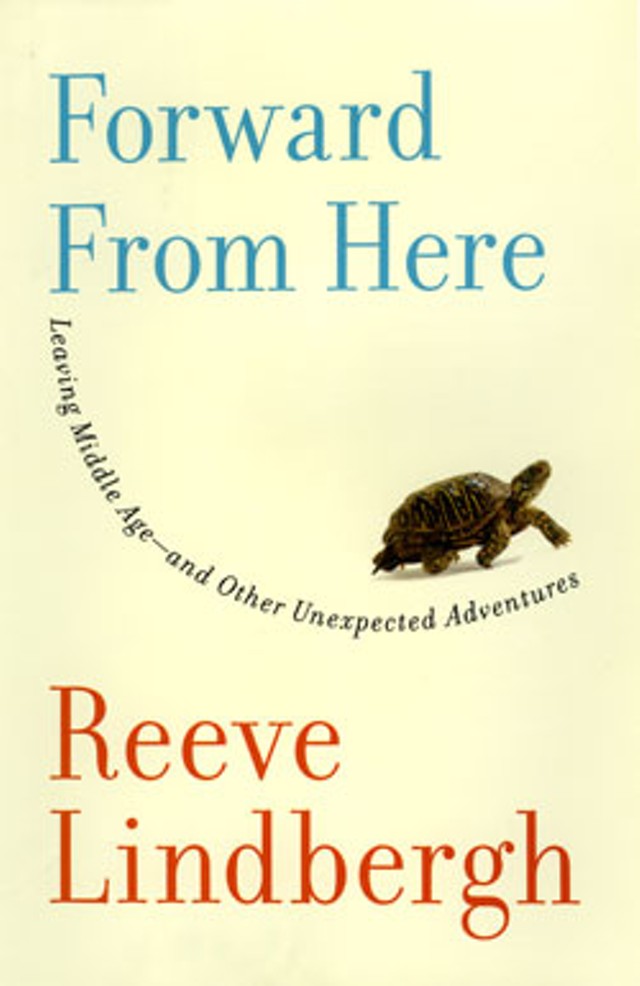 Forward from Here: Leaving Middle Age—and Other Unexpected Adventures Posted in: Memoirs
Forward from Here: Leaving Middle Age—and Other Unexpected Adventures Posted in: MemoirsBy Reeve Lindbergh – Simon & Schuster, 2008
In this gentle memoir, Reeve Lindbergh offers a thoughtful and positive perspective on aging. Describing her life in rural Vermont, she reflects on turning 60. Her book is moving and often amusing, whether she’s describing birds that took over the trees in her yard or the benign brain tumor—she named it Alice—that she lived with for six months. The last chapter recounts what happened after the news broke in 2003 that her father, aviator Charles Lindbergh, had three secret families in Europe, and that she had half brothers and sisters she hadn’t known existed.
Lindbergh notes that when she was 12, she hoped she would never grow older. Now, as she enters the period that her mother, author Anne Morrow Lindbergh, called “the youth of old age,” she is gradually coming to terms with aging and has lost most of her fear of dying. This collection of reflective essays has appeal for all.
 AARP Guide to Revitalizing Your Home: Beautiful Living for the Second Half of Life Posted in: Guides to Aging Well
AARP Guide to Revitalizing Your Home: Beautiful Living for the Second Half of Life Posted in: Guides to Aging WellBy Rosemary Bakker – Lark, 2010
With enticing color photos on every page, this book is a thorough guide to making a home a safe, comfortable place to live, either for yourself as you grow older or if you are caring for an aging loved one. Experienced in gerontology and interior design, Bakker starts with a checklist for assessing your home inside and out. She then discusses rooms and features in detail, including stairways, flooring and lighting. There are excellent ideas for every budget, from redesigning an entire kitchen to highlighting the edges of steps for better visibility. Dozens of sidebars give tips about safety, energy efficiency and promoting health and longevity. Not every home is suitable for a makeover, particularly if it has cramped rooms or too many stairs, or if the community lacks public transportation or adequate medical services. If you need to move, this book can help you evaluate your options. Browse, plan—then take practical action.
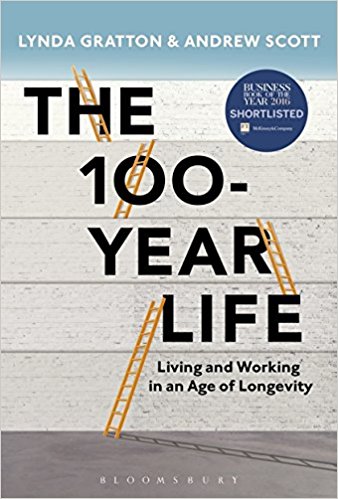 The 100-Year Life: Living and Working in an Age of Longevity Posted in: Insights from Bold Thinkers
The 100-Year Life: Living and Working in an Age of Longevity Posted in: Insights from Bold ThinkersBy Lynda Gratton and Andrew Scott – Bloomsbury, 2016
Today’s 60-year-olds have a better-than-even chance of reaching 90 or more, and the majority of today’s infants will live to at least 105, according to the authors, both professors at the London Business School. But, they argue in this fascinating book, people will need to organize their very long lives quite differently. To support themselves for 100 years, they will have to keep working through their 70s and perhaps even into their 80s. And they’ll need to live multi-stage lives, with transitions between the stages—time to rethink goals, retool skills and possibly change careers altogether. The authors acknowledge that the rich, who already live longer than the poor, are also more likely to have the education and the financial and personal resources to adapt to a multi-stage life, but overall this is an optimistic take on the future, offering both personal advice and public policy suggestions.
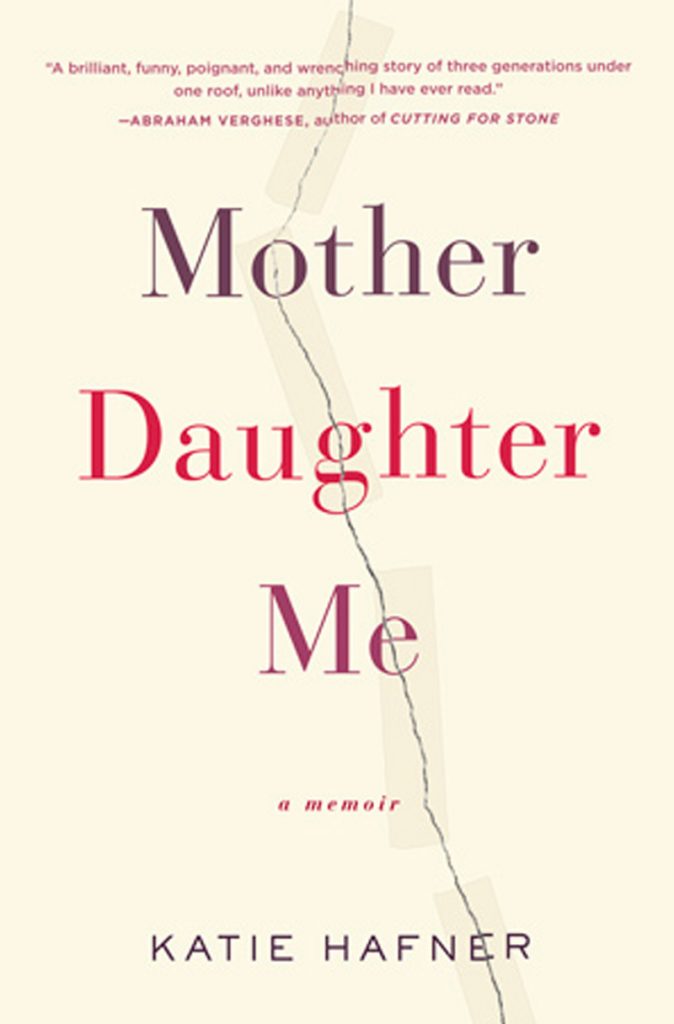 Mother Daughter Me: A Memoir Posted in: Memoirs
Mother Daughter Me: A Memoir Posted in: MemoirsBy Katie Hafner – Random House, 2013
Katie Hafner and her teenage daughter, Zoë, have made great strides in picking up the pieces after the sudden death of Hafner’s husband. So when Katie’s 77-year-old mother, Helen, suggests they all move in together, unwarranted optimism fuels their decision to do so. Maybe issues from Katie’s complicated and unhappy childhood could be resolved. But a rift between Helen and Zoë quickly jeopardizes the mother-daughter bond. Even therapy can’t help. Hafner is honest and matter-of-fact, but with the fallout from Helen’s alcoholism, there’s too much unfinished emotional business, and the trio’s best intentions fall short. A moving, must-read memoir for anyone in the sandwich generation once again living with parents—or considering such an arrangement.
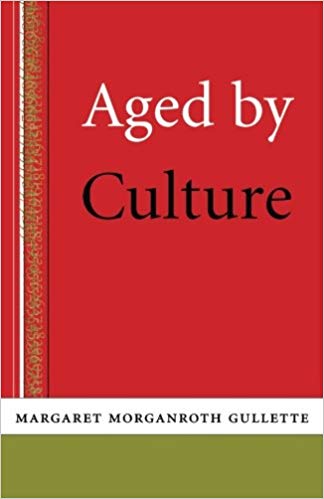 Aged by Culture Posted in: Insights from Bold Thinkers
Aged by Culture Posted in: Insights from Bold Thinkers“We are aged more by culture than by chromosomes,” Margaret Gullette writes in this passionate indictment of the American attitude to aging. Her book spells out the price we pay for living in a culture that’s obsessed with youth and that sees aging as a demeaning process of decline. Gullette focuses most on middle-ageism, noting that we’re encouraged to think of ourselves as old at younger and younger ages. Many Americans buy into such ideas and are barely into midlife when they begin to complain about memory lapses and senior moments. Middle-ageism has eroded workplace seniority systems that reward experience and has cost many people age 40 to 60 their jobs as they were pushed aside to make way for younger employees. Gullette is a resident scholar in the Women’s Studies Research Center at Brandeis University.
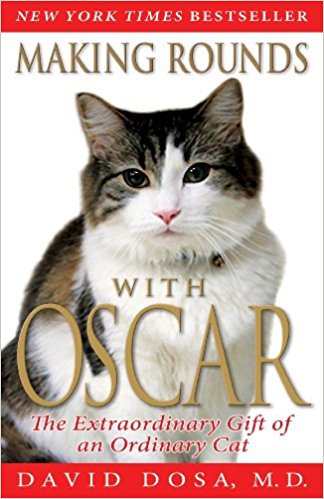 Making the Rounds with Oscar: The Extraordinary Gift of an Ordinary Cat Posted in: Life’s Endings
Making the Rounds with Oscar: The Extraordinary Gift of an Ordinary Cat Posted in: Life’s EndingsIf you relish a true story that showcases the animal-human connection, you’ll want to meet Oscar, a cat with a unique ability to sense when a person is about to die. Oscar lives in the dementia unit of Steere House nursing home in Providence, RI, where we make the acquaintance of feline-averse David Dosa, MD, and his staff, patients and families. This is more than a cat tale, it is the coming-of-age story of Dosa, a compassionate but skeptical geriatrician who learns to trust this tabby cat, his nurses and his instincts, as he witnesses the comfort and acceptance that come with a visit from Oscar. With uncanny accuracy, Oscar jumps up and steadfastly remains on the beds of patients in their final hours. This is an insightful, warm and illuminating read about end-of-life choices and the unlikely friends who might be there to guide us.
Click here to view short David Dosa video.
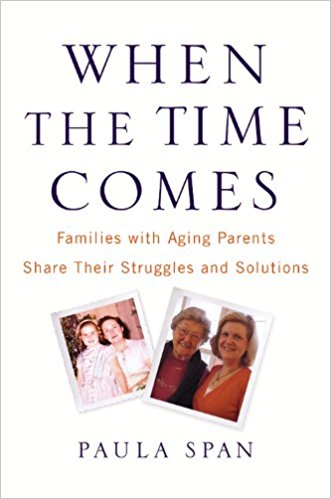 When the Time Comes: Families with Aging Parents Share Their Struggles and Solutions Posted in: Guides to Aging Well, Life’s Endings
When the Time Comes: Families with Aging Parents Share Their Struggles and Solutions Posted in: Guides to Aging Well, Life’s EndingsWhen older people develop health problems that make it risky to live alone, families have a number of options. Journalist Paula Span, who writes the “New Old Age” blog for the New York Times, explores five possibilities. She lays out the pros and cons of staying put with help from relatives or aides; moving in with adult children; moving to an assisted living facility; entering a nursing home; and getting hospice care.Span interviews families who chose each option and follows their progress as the older generation adjusts—successfully or not—to new circumstances. She provides thoughtful advice, points out common pitfalls and explains in detail what the different choices cost. Anyone who is, or may become, a caregiver will find a wealth of information and comfort here.


